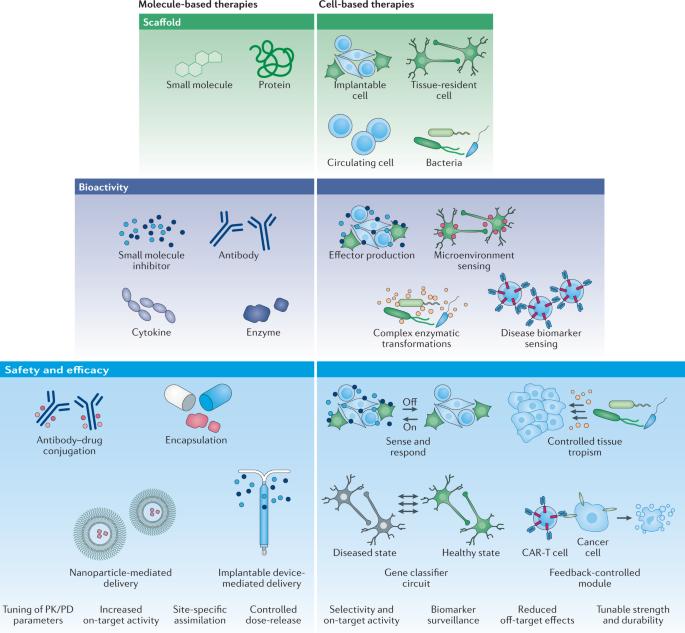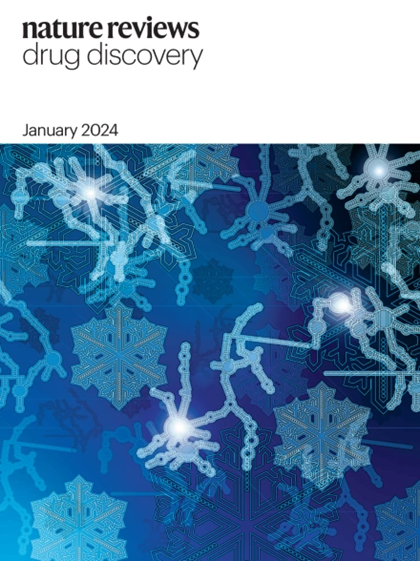Engineering living therapeutics with synthetic biology
IF 122.7
1区 医学
Q1 BIOTECHNOLOGY & APPLIED MICROBIOLOGY
引用次数: 99
Abstract
The steadfast advance of the synthetic biology field has enabled scientists to use genetically engineered cells, instead of small molecules or biologics, as the basis for the development of novel therapeutics. Cells endowed with synthetic gene circuits can control the localization, timing and dosage of therapeutic activities in response to specific disease biomarkers and thus represent a powerful new weapon in the fight against disease. Here, we conceptualize how synthetic biology approaches can be applied to programme living cells with therapeutic functions and discuss the advantages that they offer over conventional therapies in terms of flexibility, specificity and predictability, as well as challenges for their development. We present notable advances in the creation of engineered cells that harbour synthetic gene circuits capable of biological sensing and computation of signals derived from intracellular or extracellular biomarkers. We categorize and describe these developments based on the cell scaffold (human or microbial) and the site at which the engineered cell exerts its therapeutic function within its human host. The design of cell-based therapeutics with synthetic biology is a rapidly growing strategy in medicine that holds great promise for the development of effective treatments for a wide variety of human diseases. The design of cell-based therapeutics with synthetic biology is a rapidly growing strategy in medicine for the development of effective treatments for a variety of diseases. This article discusses advances in synthetic biology approaches to programme living cells with therapeutic functions as well as challenges for their development.

利用合成生物学设计活体疗法
合成生物学领域的不断进步使科学家们能够利用基因工程细胞,而不是小分子或生物制剂,作为开发新型疗法的基础。具有合成基因回路的细胞可以根据特定疾病的生物标志物,控制治疗活动的定位、时间和剂量,从而成为抗击疾病的有力新武器。在这里,我们从概念上阐述了如何将合成生物学方法应用于具有治疗功能的活细胞,并讨论了这些方法在灵活性、特异性和可预测性方面相对于传统疗法的优势,以及其发展所面临的挑战。我们介绍了在创建携带合成基因电路的工程细胞方面取得的显著进展,这些合成基因电路能够对来自细胞内或细胞外生物标志物的信号进行生物传感和计算。我们将根据细胞支架(人类或微生物)以及工程细胞在人类宿主体内发挥治疗功能的部位,对这些研发成果进行分类和描述。利用合成生物学设计基于细胞的疗法是一种快速发展的医学策略,为开发治疗各种人类疾病的有效方法带来了巨大希望。利用合成生物学设计基于细胞的治疗方法是一种快速发展的医学策略,有望开发出治疗各种疾病的有效方法。本文讨论了合成生物学方法在设计具有治疗功能的活细胞方面取得的进展及其发展面临的挑战。
本文章由计算机程序翻译,如有差异,请以英文原文为准。
求助全文
约1分钟内获得全文
求助全文
来源期刊

Nature Reviews. Drug Discovery
医学-生物工程与应用微生物
CiteScore
137.40
自引率
0.30%
发文量
227
期刊介绍:
Nature Reviews Drug Discovery is a monthly journal aimed at everyone working in the drug discovery and development arena.
Each issue includes:
Highest-quality reviews and perspectives covering a broad scope.
News stories investigating the hottest topics in drug discovery.
Timely summaries of key primary research papers.
Concise updates on the latest advances in areas such as new drug approvals, patent law, and emerging industry trends and strategies.
 求助内容:
求助内容: 应助结果提醒方式:
应助结果提醒方式:


